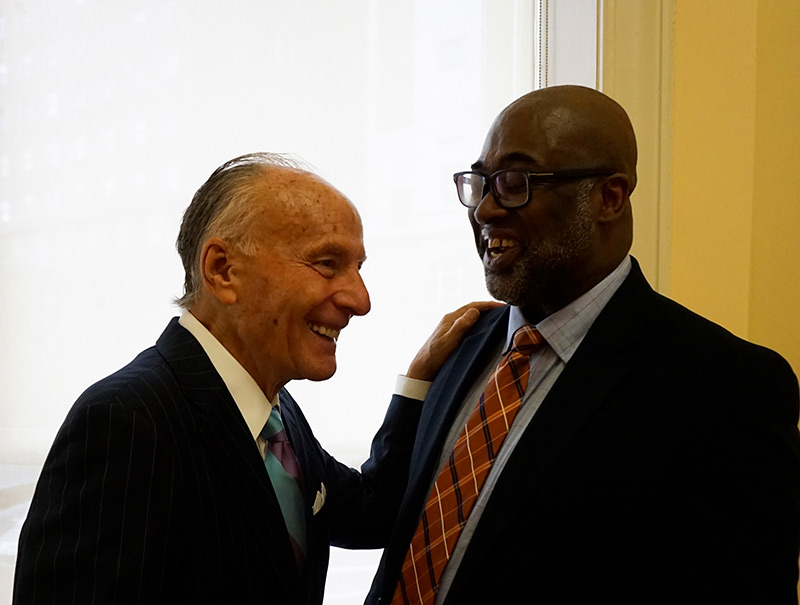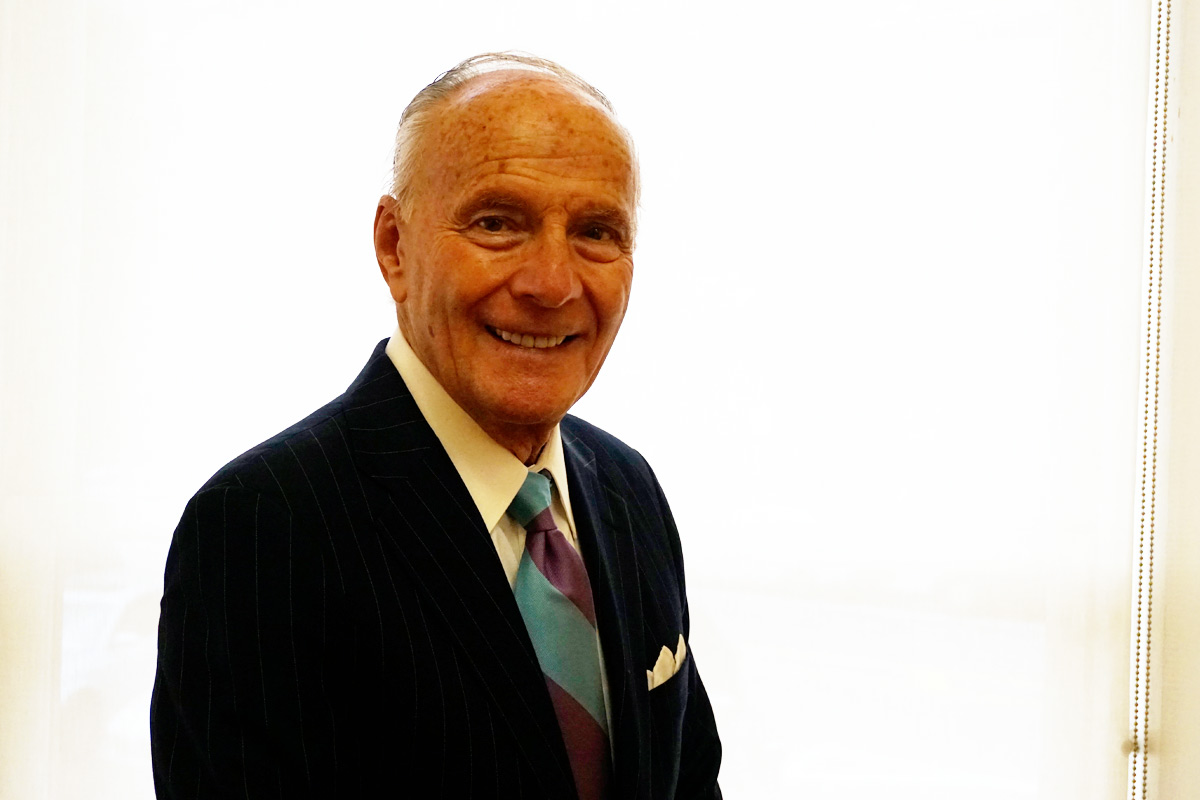If you know the history of the community health field, the discovery of the name Michael Carrera on the TC Health & Behavior Studies faculty page can be akin to finding out that John Dewey is back teaching an evening course on inquiry-based learning.
Carrera, a TC alumnus and the Thomas Hunter Professor Emeritus of Health Sciences at Hunter College CUNY, is a pioneer in the field of teen pregnancy prevention and, more broadly, student health. Over the past 40 years, as the founding director of the Carrera Adolescent Pregnancy Prevention Program of the Children’s Aid Society, he has raised more than $150 million to bring his highly successful “above-the-waist” approach to contraception to 21 states and the District of Columbia.
The CAS-Carrera program, as it is known, is among the very few recognized by the U.S. government as evidence-based and statistically effective. A three-year randomized controlled trial found that female participants in the program were 40 percent less likely to have ever been pregnant and 50 percent less likely to have ever given birth; that male participants showed substantial knowledge gains, greater use of medical care other than the emergency room, and higher rates of visits to reproductive health-care clinics and vaccination for hepatitis B. Both sexes were 30 percent more likely to have graduated from high school or obtained a G.E.D, and 37 percent more likely to be enrolled in college.
Mike is a hero to me. He has improved the lives of so many youth facing poverty and extreme hardships by changing their view from being ‘at risk’ to being ‘at promise.’ He has believed in each person and seen their potential, because he truly cares – and he’s helped each person believe in themselves.”
—Charles Basch
Carrera’s book, Sex, The Facts, The Acts and Your Feelings, has been translated into 17 languages; and he has received a slew of honors, including TC’s Distinguished Alumna Award. But perhaps most telling of all is how other leaders in the field talk about him.
“Mike is a hero to me,” says Charles Basch, TC’s Richard March Hoe Professor of Health Education, who is nationally known for his own efforts to promote a school-based model of ensuring student health. “He has improved the lives of so many youth facing poverty and extreme hardships by changing their view from being ‘at risk’ to being ‘at promise.’ He has believed in each person and seen their potential, because he truly cares – and he’s helped each person believe in themselves. And he’s provided the kinds of educational opportunities, social-emotional supports, and physical and mental health services that young people need to succeed in school and in life.”
[Read about Basch’s vision for using schools themselves as a venue for overcoming student health disparities that contribute to the nation’s achievement gap.]
In 1970, when Carrera, a first-generation college student from the Bronx, completed his TC doctorate, teen pregnancy was at epidemic levels – and in the central Harlem community where Carrera began working at a Children’s Aid Society after-school program, three in four girls were becoming pregnant annually. There was no literature yet on prevention, but Carrera, who had worked at TC with Gilbert Shimmel, later chair of the Health Education department at Hunter and director of the Sexuality Information and Education Council of the United States (SIECUS) and James Malfetti, co-author of the groundbreaking 1964 sex-education text Reproduction, Sex and Preparation for Marriage, had some ideas.
“I had spent months just talking to the kids, being present,” he recalls. “I started to have conversations with them on what they needed to hear about sex – reproductive health services, yes, but about their bodies, too. They liked it, and about 10 to 15 of them were showing up every week, which in youth work, really means something.”
But then came a rude awakening. “Over time I learned that what was happening outside our workshops wasn’t changing,” Carrera says. “The kids were still having random sexual contact, coercive sex and sex without contraception. So I started asking them what else was on their minds, and the answers were, ‘Well, I want a j-o-b.’ ‘I’m having trouble sleeping – I have things on my mind.’ ‘I want to go to college, but I’m failing in school – and I don’t want my grandma to know.’ ‘I need to sleep someplace else than at home.’ And the list went on – abuse, neglect racism – and I’m talking to them about sex! I was out of alignment, which is really critical in all work in education. Are we aligned to achieve the outcomes and impact we seek?”
So Carrera broadened the conversation. On March 10th, 1984, he began meeting with young people seven days a week, and adding services and activities that included help with school, mental health, arts, sports, and comprehensive medical and dental services. Initially he scraped money and donated services together from people he knew. Then, in 1989, he received his first big grant, from the Robin Hood Foundation – and today, as he likes to joke, “we’re in our 34th year of not being sustainable.”

APPLYING THE LESSONS Lassiter, who runs the same center where Carrera worked with him as a teen, says he, too, believes in giving kids a second chance.
“It’s a systems approach,” he says of his program. “And that’s what’s missing today from education in general. You can’t teach your way out of social problems. Currently our obsession is with academics, discipline and classroom management, when we should be thinking about social and emotional learning, along with, ‘What are all the factors that affect the development of a young person?’ Of course, that’s more expensive and challenging to do up front, but when you think of the money being spent without results right now, it simply becomes a question of resources, will and devotion to purpose.”
Beyond numbers from clinical trials, perhaps the most powerful evidence of return on investment from Carrera’s method are the lives of individual young people he’s worked with.
“Because I’ve been doing this for so long, there are dozens and dozens of adult women and men who started with me in 1984,” he says. That group includes Casper Lassiter, who holds a master’s in social work and now directs that same Children’s Aid Society center in Harlem (Carrera’s granddaughter did an internship there recently, becoming the third generation of his family to work there) and Felipe Ayala, Jr., now an academic counselor at CUNY Bronx Community College.
“Back in the 80s, Harlem wasn’t like it is now – we were surrounded by a sense of hopelessness, and the one bright spot was the community center,” Lassiter says. “Doc gave us a sense of direction and purpose and made us believe we could survive and be successful in the midst of all the negativity around us. And I still draw on what he taught me about building relationships with kids – giving them a second chance, seeing their potential.”
You can’t teach your way out of social problems. Currently our obsession is with academics, discipline and classroom management, when we should be thinking about social and emotional learning, along with, ‘What are all the factors that affect the development of a young person?’ Of course, that’s more expensive and challenging to do up front, but when you think of the money being spent without results right now, it simply becomes a question of resources, will and devotion to purpose.”
—Michael Carrera
This past May, Carrera also attended a high school graduation ceremony in Tulsa, Oklahoma, for 90 young people who participated in the first middle- through-high school cohort of his program there. Every single one of them was college-bound.
“Many state and local politicians opposed us there,” he says, “but the parents never did.”
So why has Carrera come back to teach at Teachers College? He’s enthused about Basch’s vision of using schools to deliver critical physical and mental health services to students, and of harnessing the power and potential of TC students to drive change.
[Read an essay by Wenimo Okoya, a fifth-year doctoral student in Health Education who directs the Children’s Health Fund’s Healthy and Ready to Learn initiative, on the need for teachers to be able to identify problems students are facing outside the classroom.]
“We need to build an emphasis on social and emotional needs into the school culture in a deep and compelling way – and Chuck’s plan has extraordinary potential,” he says. “I hope that TC and all education schools come up with a sustainable approach to making that a reality.”
With federal funding for social programs being rolled back, he also believes it’s critical to prepare a new generation of educators to embrace “a deep, holistic approach to advance the development of young people beyond where they are now.”
“When I was a TC student, Gib Shimmel and Jim Malfetti believed that we were beginning a new era when there would be sex education teachers in every school,” he says. “That didn’t happen, but I still believe it can.”
But most of all, Carrera – to borrow his own terminology – seems to feel most in alignment on West 120th Street.
“TC set the foundation for me on understanding sexuality and sexual expression, and gave me an ability to talk about it comfortably in public,” he says. “This is where it all began – and where I believe it can best continue. It’s good to be home.”
